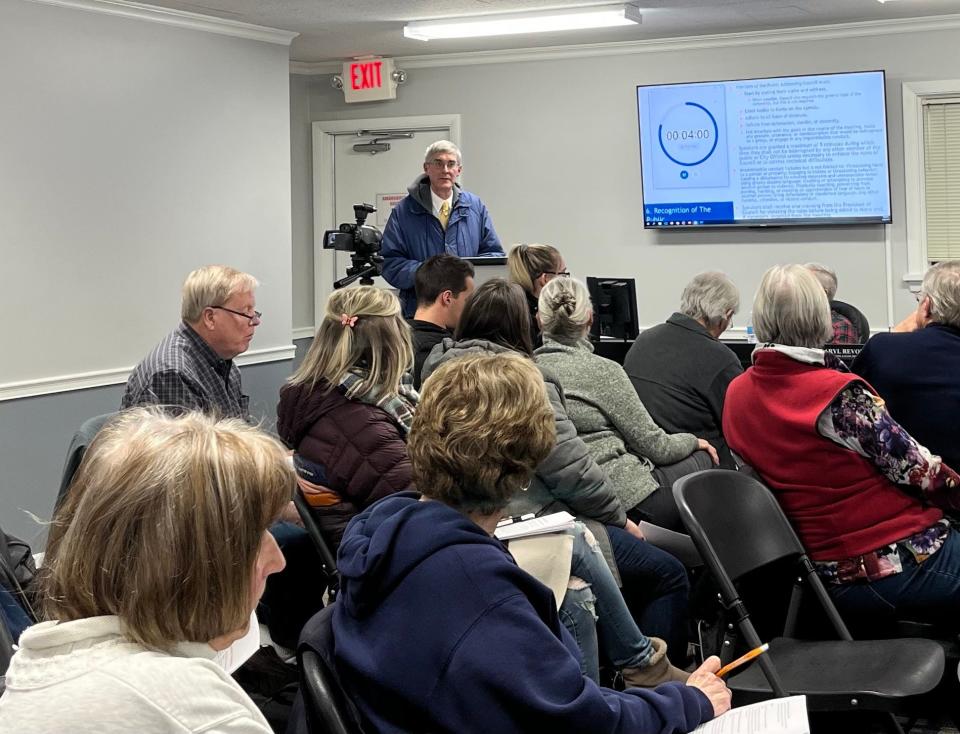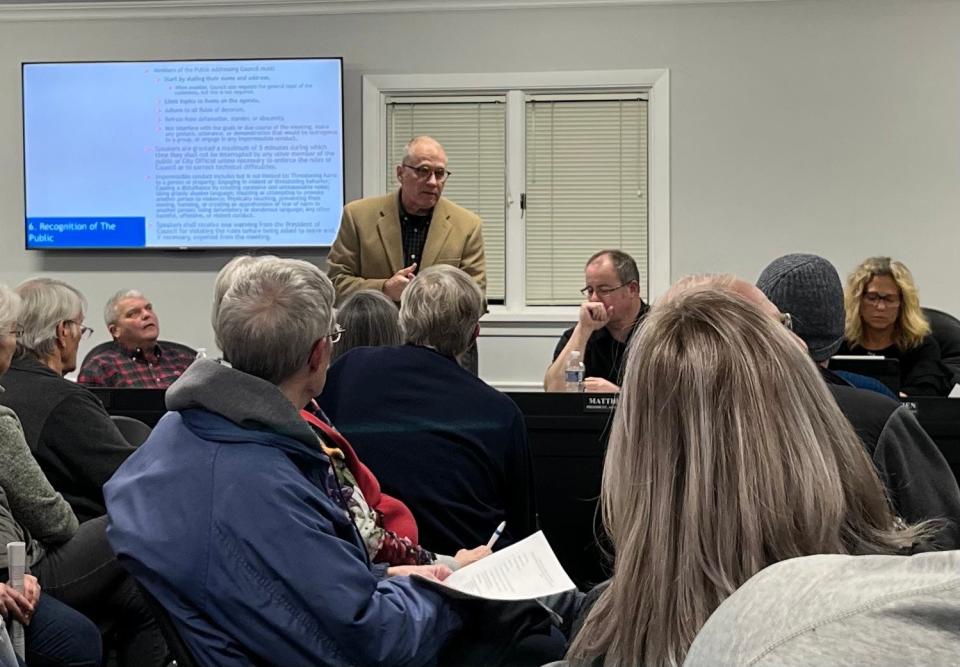'Keep my neighborhood the way it is.' North Canton residents object to rezonings
NORTH CANTON − The city has limited land and wants more employers that will generate income tax dollars to help pay the growing cost of police, fire and paving roads.
But many residents don't want businesses, plus the traffic and construction that might come with it, in their neighborhoods.
That conflict was on display Monday evening as about 30 residents packed the City Council meeting at the North Canton Civic Center to object or express concerns on proposals in a master plan draft made public earlier this month to rezone their neighborhoods. The rezonings, if approved under a separate process, would allow commercial activity to take place in two neighborhoods adjoining downtown that are exclusively residential.

"We are here solely because we do not want mixed-use zoning in our neighborhoods," said Susanne Cecil, who lives on Fifth Street NE.
She said she doesn't want her block transitioning to a commercial area with coffee shops attracting foot and vehicle traffic.
"We want the peacefulness that's North Canton," Cecil said. "We want to stay as we are ... and we don't want that threatened."
Susan Meadows of Sixth Street NE said, "I do not want a donut shop next to my house. I don't want a bakery and car repair shop (by) my house. ... I don't want my neighborhood torn down."
More:North Canton overhauls Main Street zoning
What about the money?
Councilman Daryl Revoldt, At-Large, indicated he was fine with dropping the proposals for the rezonings from the master plan draft, meant to succeed the city's 2012 master plan. But he said the city has yet to fully recover from losing at least $1.6 million a year in income tax revenue after the Hoover Co. plant closed in 2007. During remarks lasting for more than 20 minutes, he asked what was the plan to generate more revenue to pay for the higher cost of providing services.
More:North Canton moves forward almost a decade after Hoover Co.

"I have to pay the police officers. I have to pay the firemen. How do we do that? We tax people. Primarily, the people who work at Diebold (Nixdorf)," Revoldt said, referring to the major Hoover District tenant. "Tell me what you're for. And tell me how you get there. The status quo doesn't work."
More:North Canton considering placing paving, storm sewer tax hikes on May ballot
Controversial proposals
The version of the plan introduced this month, drafted by a citizen's committee but refined by city officials, calls for two areas near the Hoover District to be rezoned from residential to "mixed-use." That could allow businesses like a coffee shop, an insurance office or a convenience store to eventually be located among homes.
The master plan is not legally binding. For council to implement any proposed rezonings in the plan, the Planning Commission would have to review such changes, inform directly affected properties and hold a hearing. Council would have to vote three times to approve a rezoning.
After residents spoke on the issue for more than 40 minutes, council voted unanimously to remove from the master plan draft the proposals to rezone the two neighborhoods. It approved the amended master plan, but council must approve the plan two more times to adopt it.
The draft had called for allowing commercial development in the residential area with 35 properties between Fifth Street and Seventh Street NE east of North Main Street and west of Park Avenue NE. And the residential area with 23 properties adjoining Cole Avenue SW and Harmon Street SW west of St. Paul's Catholic Church and east of Witwer Park.
The writers backed by urban design consultants argued that the city has "very limited opportunities for commercial development," these areas are ideal for some commercial development because they adjoin zones that have mixed-use, commercial and industrial activity.
Other master plan proposals remain in the draft. They call for extending the commercial Main Street Central District in two locations. The first, east along East Maple Street to 44 properties to prevent the building of homes and driveways, to create a natural barrier between residential and commercial areas. The second, to a "formerly residential block" in the Hoover District with 15 properties by Hower and Witwer streets NE zoned partially industrial and partially residential, with a few remaining homes. Not only would it bolster commercial development, but it would prevent industrial development by homes across Taft Street NE, the plan draft said.
Fear of losing tranquility
Charlene Lange of Sixth Street NE questioned why commercial activity should be allowed in her neighborhood.
"There are so many vacant places on Main Street," she said. "Why can't you just keep it there?"
Those who drafted the master plan in a frequently-asked question document circulated at the meeting argued that permitting businesses to set up shop in residential neighborhoods could boost residential property values. Residents would be able to walk to more nearby businesses.
Lange said if that's true, she would end up paying more in property taxes.
"How high can you go until I can't live there on my fixed income?" Lange asked.
The document said the master plan "is a collection of ideas for the future of our city. It's a vision. It's not set in stone." It said a mixed-use district would likely only permit businesses that can best exist with homes such as a doctor, lawyer or financial institution's office, "restaurants, retail stores and personal services. Uses that may be disruptive to homes are not permitted such as gas stations, car washes, auto shops and warehouses."
David Saylor said he's lived for 63 years at his 115-year-old home on Cole Avenue SW, once owned by his grandparents.
"I'm going to die there," he said. "I ask you to keep my neighborhood the way it is."
Other council action
Council also voted to place on the May 2 primary ballot a one-mill replacement and one-mill increase for five years for its street and storm sewer levies. Each levy increase if approved would increase the cost to the owner of a $100,000 home by about $44.27 a year. Each levy would generate $1.03 million a year, an increase from the current $387,216.
Reach Robert at robert.wang@cantonrep.com. Twitter: @rwangREP.
This article originally appeared on The Repository: Not in my neighborhood. North Canton residents don't want rezonings

